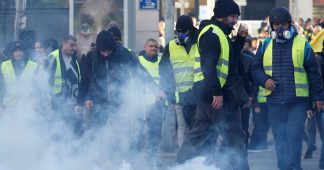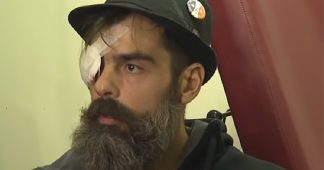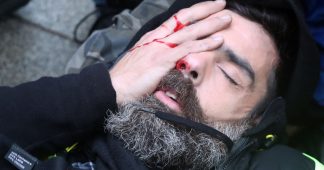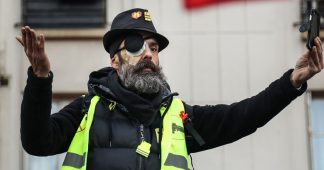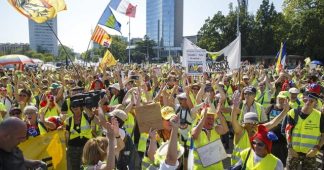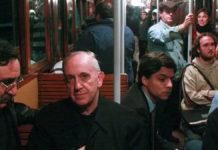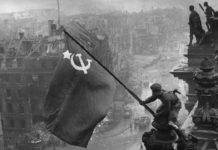By Robert Chalmers
Classified ‘sublethal’, the rubber bullets, teargas and stun grenades used by French police have nevertheless maimed, blinded and killed almost as many in the last six months as in the 20 years before the ‘yellow jacket’ protests began taking to the streets of La République. To investigate how and why our cousins across the water have stood firm in the face of authorised force that would shock and outrage anywhere else in Europe, GQ’s Robert Chalmers joined les gilets jaunes
“Most of us who’ve lost an eye were hit near the cheekbone or temple,” says Jérôme Rodrigues, “at which point, that section of your skull shatters. Your cranium is then reconstructed using screws and titanium plates. I was fortunate in that I had no skeletal injury. The officer responsible aimed directly at my eyeball, which burst.” He pauses. “Coffee?”
We’re talking in the kitchen of his studio flat in a quiet village 25 miles north of Paris. Rodrigues, 40, the most engaging and articulate of the prominent gilets jaunes – he doesn’t appreciate being called a “leader” – hands me a grey object roughly as large as a roll-on deodorant: a 40mm calibre projectile from a weapon known as an LBD 40, popularly referred to as a Flash-Ball. Its rigid outer casing, weight (60g) and speed of trajectory (360kph) makes it absurdly euphemistic to refer to it as a “rubber bullet”.
Rodrigues was filming on his mobile phone when he was blinded by an LBD in the Place de la Bastille on 26 January, during the eleventh “Acte”, as the gilets jaunes call their Saturday demonstrations. Acte I took place on 17 November 2018. The first thing you hear on Rodrigues’ recording is the launching of a stun grenade – the widely feared GLI-F4, which is packed with TNT and has blown off the limbs of several protestors. A second later comes the sound of the LBD discharging, a noise similar to the popping of a Champagne cork. After several weeks of accompanying the gilets jaunes both sounds are familiar to me. It’s come to the point these days that when I hear the word “Paris”, the sensual associations the French capital is supposed to evoke – the scent of Guerlain, Gitanes and the sound of the street accordion – have long since been supplanted by the astringent taste of teargas, fumes from burning car tyres and the scream of police sirens.
“As you can hear,” says Rodrigues, replaying the footage, “just before I am hit I’m telling my friends to keep moving, so they’re not sitting ducks.”
When Rodrigues falls to the ground, his mobile hits the pavement but continues to record. People call for the street medics – the volunteers, mainly off-duty nurses, who tend to the wounded gilets jaunes. A woman screams.
“They’ve taken his eye out,” somebody shouts. “His eyeball has gone.”
Some who are unfamiliar with the robust methods of the Compagnies Républicaines De Securité (CRS), the French riot police, might accuse Rodrigues of paranoia when he talks about being cynically targeted.
“They shot directly at my eye,” says Rodrigues, who, before he was mutilé (a word formerly associated with soldiers “mutilated” on the battlefield, it’s one you hear a lot when conversation turns to the gilets jaunes) had been working as a plumber. Even before he was shot, he had been interviewed regularly on television and with his then full beard, now trimmed, was already a unmistakable figure.
Read more at https://www.gq-magazine.co.uk/politics/article/les-gilets-jaunes
